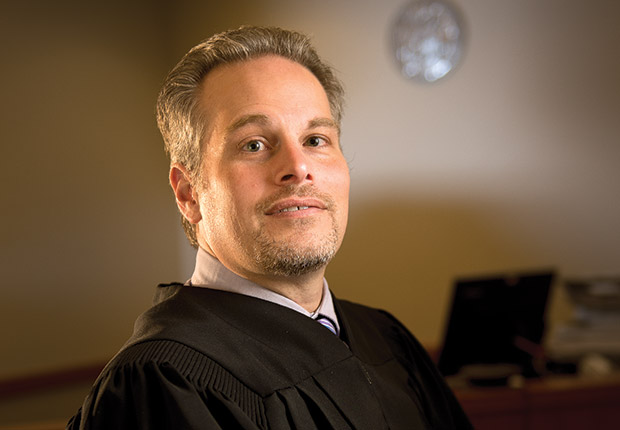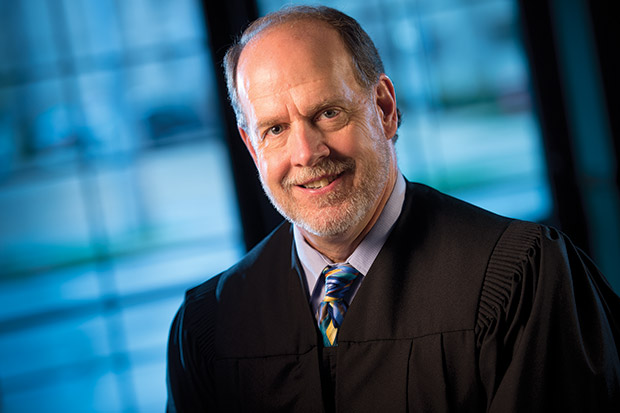If I knew then… Making pals with municipal court judges
By: JESSICA STEPHEN//April 19, 2017//

If there is a Golden Rule for municipal court, it’s this:
“Be prepared. It’s the No. 1,” said Bob Kupfer, municipal judge for the village and town of Somers in Kenosha County.
A municipal judge for 12 years, Kupfer has seen his share of lawyers who are less than ready for prime time, at least for stepping out on the municipal-court stage. They can fall short in everything from not understanding what sorts of experiences judges are likely to have – their backgrounds can vary widely in Wisconsin – to not understanding a court’s larger purpose in the community.
“They go from the very sporadic, seldom-held court for a zoning violation or an animal issue to the city of Milwaukee, which has three full-time municipal court judges. That’s a big range,” said Jason Hanson, president of the Wisconsin Municipal Judges Association, who spends about two evenings a week in court as municipal judge for the villages of Deforest and Windsor in Dane County.
The lack of preparation is, perhaps surprisingly, most evident at trial.
“Sometimes lawyers – and I’m trying to be careful how I say this – use municipal court as informal discovery because they plan on trying their case in circuit court; they use it as a stepping stone,” said Rändi L. Othrow, municipal judge in McFarland, also in Dane County.
“And I think we all understand that,” Hanson said. “Obviously, it’s frustrating, if it becomes needlessly time consuming and a fishing expedition. But it’s understandable and part of the system.”
Still, if Othrow and Hason could give attorneys a primer about municipal court, they said, they would encourage lawyers to take the experience more seriously.
“Develop your arguments and, maybe, win. Don’t treat it as an informal deposition,” Othrow said.
That might sound like obvious advice. But for the many attorneys who seldom, if ever, appear in municipal court, it’s something that isn’t always immediately apparent.
Another lesson lawyers could stand to learn? Their place in municipal court.
“I think one of the biggest surprises for attorneys is the amount of pro se litigation,” Hanson said. “…I can sort of watch the reactions on their faces as they’re watching the things that are going on.”
In municipal court, which deals largely with disorderly conduct, animal control, trespassing, health- and building-code violations and traffic tickets, most defendants represent themselves. For many judges, that calls for looking at the rules of court through a slightly different lens than, say, a circuit court judge might peer through.
“Municipal court really is the original People’s Court,” Othrow said. “It’s really the only exposure most people have to court, and people really want to tell their stories. So I, as a municipal judge, might let people go on longer than a circuit-court judge because people want to be heard. And I think lawyers should realize most municipal judges will let people tell their stories or have their cases heard, even if a lot of it can’t be used because it’s hearsay. It’s a little more compassionate, because I don’t want people to leave thinking it was a bad experience.”
A judge’s experience is also influential in municipal-court proceedings
In Wisconsin, municipal judges are not required to be lawyers. And, in about half the municipal courts in the state, they’re not.
For Hanson, who works full time as Dane County Circuit Court commissioner and leads seminars for municipal judges, that’s not necessarily a bad thing.

“It’s interesting to watch the wheels turn with the folks in the audience,” Hanson said. “Everyone is at a different place and a different level. We, as lawyers, tend to think we’re the experts at everything, but I see some wonderful thoughts and ideas come from my non-attorney municipal-judge colleagues.”
This presents another lesson of municipal courts: Don’t underestimate a non-attorney municipal judge, but don’t assume judges (even attorney judges) know everything about the law.
“Remember that when you’re talking to a municipal-court judge, even though they might be a lawyer, they might not have a lot of criminal background or know the criminal laws or the criminal code,” Othrow said. “I’m mostly a kids’ lawyer; I have experience doing trial work in termination of parental rights and children-in-need-of-protective-services cases. But that’s a little different from a circuit-court judge having experience with more areas of the law.”
This is why, Hanson said, he encourages lawyers to prepare opening remarks.
“I don’t want a 40-minute opening statement,” Hanson said. “But a very brief statement of: Here’s what’s in dispute, or here’s what could be helpful. And I don’t often see that. But I think it’s helpful for lawyers to have in their mind a 30-second opening statement. They’re not always asked to give it, but I’ve never told someone they couldn’t give one. And, sometimes, it’s helpful for the judge to have a summary of the contested issue. If I can have some clue on what the general contested issue is, I can listen better and know where things are going. That’s also a good opportunity to teach the judge a little something about the law, if you think there is something particularly important.”
Another tip for appearing in municipal court: Know the rules of evidence.
“Hearsay is still hearsay,” Hanson said. “And I have heard lawyers say, ‘But this is municipal court.’ …I’m assuming it’s an honest mix-up, but that’s part of the preparation and knowing what you’re doing and where you’re doing it.”
Also, unlike in circuit court, defendants in municipal court can be called as a witness for the municipality. Most clients seem ill prepared for that, Hanson said.
“They seem to be a little off their game when called adversely,” he said. “And the look on their faces — you can see all the things flash through their minds. It just seems like the client is totally shaken by it, and I have to suspect they weren’t told that could happen. And it happens often enough that I would have prepared my client for that.”
Municipal court also has strict time limits concerning procedures like appeals and requests for hearings when someone refuses to take a test measuring blood-alcohol content.
“The law is pretty clear that we don’t have discretion to extend those time limits,” Hanson said. “It’s more a pro se issue, but sometimes it’s lawyers.”
When it comes to appeals, those time limits are particularly unforgiving, Hanson said.
“There’s a bunch of cases that say, ‘If you mess up, the circuit court doesn’t have jurisdiction to review it,'” he said. “And that’s a pretty harsh consequence. If you mess that up, you’ll be talking to your malpractice insurance carrier.”
And when it comes to communicating about cases, make sure the judge is out of earshot.
“Don’t talk to my clerk about a case in front of me,” said Othrow, who recently led a seminar on municipal courts for the State Bar of Wisconsin’s Solo and Small Firm Conference. “Maybe it’s scheduling witnesses? That’s probably not that bad. But ex parte rules and ex parte communication applies to judges in municipal court, as it does for any other court.”
Bottom line: Don’t sell municipal court short.
“It is a court,” Hanson said. “Be on time. Be prepared. Be respectful. Don’t insinuate that it’s a kangaroo court of sorts or people are in cahoots or something. And I’ve heard stories about some of that stuff. We get that we’re at the bottom of the totem pole and, if there’s conflicts with schedules, the higher court is going to prevail. I get that. Make the continuance request but don’t show up a half hour late and say, ‘I was stuck in circuit court’ or ‘It’s only municipal court.’ Because for their clients, it’s not only municipal court.”
“We are the court were many people in Wisconsin have their only court experience,” Othrow said.
Did you know?
Municipal court cases include disorderly conduct, animal control, trespassing, health- and building-code violations and traffic tickets, including cases involving first offense operating while intoxicated.
In one recent year, municipal courts processed over 574,000 citations.
There are about 240 municipal courts in Wisconsin, representing about 400 towns, villages and cities. Judges serve part time in all but one of the state’s municipal courts; Milwaukee County has three full-time municipal judges.
There are no jury trials in municipal courts; only circuit courts can have jury trials. But municipal courts can have court trials.
First-offense-OWI cases are the exception to this rule; defendants must pay a fee to have their cases transferred to circuit court for trial.
Also, municipal courts’ decisions can only be appealed if there has been a court trial.
Municipal courtrooms have no court reporters, although many have audio- or video-recording systems, similar to circuit court commissioners.
About half of the municipal judges in Wisconsin are lawyers. The rest are retired police officers, even cosmetologists.
Full-time municipal judges get paid more than circuit-court judges, who make about $131,000. Milwaukee County’s full-time municipal judges make about $133,285. But others, like Othrow, make about $600 a month.
Sources: Municipal Court Judge Rändi L. Othrow, Wisconsin Court System
Legal News
- Former law enforcement praise state’s response brief in Steven Avery case
- Eric Toney announces re-election bid for Fond du Lac County District Attorney
- Former Wisconsin Democratic Rep. Peter Barca announces new bid for Congress
- Republicans file lawsuit challenging Evers’s partial vetoes to literacy bill
- More human remains believed those of missing woman wash up on Milwaukee Co. beach
- Vice President Harris returning to Wisconsin for third visit this year
- Wisconsin joins Feds, dozens of states to hold airlines accountable for bad behavior
- Trump ahead of Biden in new Marquette poll
- Bankruptcy court approves Milwaukee Marriott Downtown ‘business as usual’ motion
- New Crime Gun Intelligence Center to launch in Chicago
- Arrest warrant proposed for Minocqua Brewing owner who filed Lawsuit against Town of Minocqua
- Wisconsin Supreme Court justices question how much power Legislature should have
WLJ People
- Power 30 Personal Injury Attorneys – Russell Nicolet
- Power 30 Personal Injury Attorneys – Benjamin Nicolet
- Power 30 Personal Injury Attorneys – Dustin T. Woehl
- Power 30 Personal Injury Attorneys – Katherine Metzger
- Power 30 Personal Injury Attorneys – Joseph Ryan
- Power 30 Personal Injury Attorneys – James M. Ryan
- Power 30 Personal Injury Attorneys – Dana Wachs
- Power 30 Personal Injury Attorneys – Mark L. Thomsen
- Power 30 Personal Injury Attorneys – Matthew Lein
- Power 30 Personal Injury Attorneys – Jeffrey A. Pitman
- Power 30 Personal Injury Attorneys – William Pemberton
- Power 30 Personal Injury Attorneys – Howard S. Sicula











